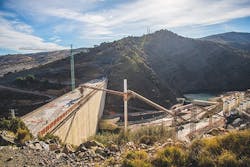Lubricants help companies around the globe increase equipment productivity
Working with construction industry companies for decades has helped Shell Lubricants to understand their challenges. Even in regions where demand for construction work continues to grow, projects are becoming increasingly competitive and companies face tighter deadlines, longer payment terms, and smaller margins.
Selecting the right oils and greases and adopting effective lubrication management strategies can help companies take better care of their equipment. This can help increase profitability by lowering maintenance costs, reducing unplanned downtime, and increasing productivity.
For example, a Brazil-based construction company was constructing a large dam in Venezuela. Extracting stone from the river to be crushed for cement was resulting in water contamination of the grease, which led to decreased life of their bucket pins and bushes. As the bucket pins and bushes needed replacing every 250 hours, this resulted in increased downtime for its excavators and mounting maintenance costs. A water-resistant lubricant was becoming increasingly critical for reducing the company’s spiraling costs. Shell Lubricants technical experts recommended Shell Gadus S3 V460D 2—a grease with strong water resistance—to suit the project’s working conditions. With the new grease, the customer reported annual savings of $3.8 million, primarily through increased productivity/less downtime and lower maintenance, labor, and component costs.
A second example involved a Canadian construction company, which uses equipment in temperatures ranging from –25 to +40°C. The company faced the logistical challenge of using separate final-drive and transmission lubricants, and different product combinations during the summer and winter seasons. Shell experts recommended Shell Spirax S6 CXME 10W-40, a multipurpose synthetic product for use throughout the year. Following the switch, the customer reported annual savings of $140,298 from fewer oil changes, reduced oil consumption, increased productivity/less downtime, and lower maintenance costs.
Finally, an Indonesian company provides logistics services in the Port of Surabaya, Indonesia. The company operates nine reach stackers in dusty, humid conditions with temperatures of about 35°C. The reach stackers are powered by Volvo TWD 1240 and MAN D2824 engines. The company wanted to change to a lubricant with a longer oil-drain interval, but one that also met the equipment manufacturers’ specifications, so they sought advice from the local Shell Lubricants distributor. The Shell Lubricants distributor recommended that the company should change the engine oil to Shell Rimula R4 X 15W-40, which is designed to deliver acid and corrosion control, protection from engine wear, and deposit control. In addition, the company was offered two Shell Lubrication management services: Shell LubeSurvey, in which Shell Lubricants technical experts assess the customer’s site and recommend complete lubrication systems; and Shell LubeCoach training program to help employees understand the importance of lubrication to successful day-to-day operations.

